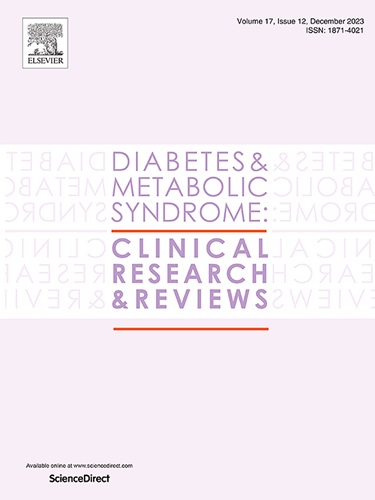Meta-analysis and meta-regression of intermittent fasting effects on glycaemic control in type 2 diabetes: Subgroup analyses and variability
IF 3.4
Q1 ENDOCRINOLOGY & METABOLISM
Diabetes & Metabolic Syndrome-Clinical Research & Reviews
Pub Date : 2025-07-01
DOI:10.1016/j.dsx.2025.103279
引用次数: 0
Abstract
Aims
To assess the effects of intermittent fasting (IF) on glycaemic control in people with type 2 diabetes (T2D), using meta-analysis and meta-regression.
Methods
We systematically reviewed and analyzed studies evaluating IF regimens, including time-restricted eating, alternate-day fasting, and periodic fasting. Outcomes assessed were HbA1c and fasting glucose. Subgroup and interaction analyses explored effects of BMI, age, sex, adherence, and IF type.
Results
Seventeen studies (n = 1169) were included. IF significantly improved glycaemic control (SMD: 0.84; 95 % CI: 0.45–1.22, p < 0.001). Subgroups with higher BMI and adherence showed greater improvements. Time-restricted eating yielded the largest effect sizes. No significant moderation by age, sex, or study duration was found.
Conclusion
IF is effective for improving blood glucose in T2D, particularly with high adherence and in people with obesity. Standardizing IF protocols and improving adherence could enhance future interventions.
间歇性禁食对2型糖尿病血糖控制影响的meta分析和meta回归:亚组分析和变异性。
目的:通过meta分析和meta回归,评估间歇性禁食(IF)对2型糖尿病(T2D)患者血糖控制的影响。方法:我们系统地回顾和分析了评估IF方案的研究,包括限时进食、隔日禁食和周期性禁食。评估的结果是HbA1c和空腹血糖。亚组和相互作用分析探讨了BMI、年龄、性别、依从性和IF类型的影响。结果:纳入17项研究(n = 1169)。IF可显著改善血糖控制(SMD: 0.84; 95% CI: 0.45-1.22, p)结论:IF可有效改善t2dm患者的血糖,尤其是高依从性患者和肥胖患者。标准化IF方案和提高依从性可以加强未来的干预措施。
本文章由计算机程序翻译,如有差异,请以英文原文为准。
求助全文
约1分钟内获得全文
求助全文
来源期刊

Diabetes & Metabolic Syndrome-Clinical Research & Reviews
ENDOCRINOLOGY & METABOLISM-
CiteScore
22.90
自引率
2.00%
发文量
248
审稿时长
51 days
期刊介绍:
Diabetes and Metabolic Syndrome: Clinical Research and Reviews is the official journal of DiabetesIndia. It aims to provide a global platform for healthcare professionals, diabetes educators, and other stakeholders to submit their research on diabetes care.
Types of Publications:
Diabetes and Metabolic Syndrome: Clinical Research and Reviews publishes peer-reviewed original articles, reviews, short communications, case reports, letters to the Editor, and expert comments. Reviews and mini-reviews are particularly welcomed for areas within endocrinology undergoing rapid changes.
 求助内容:
求助内容: 应助结果提醒方式:
应助结果提醒方式:


